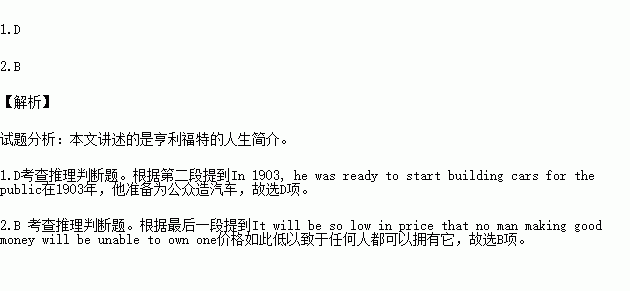题目内容
Henry Ford was born on a farm on July 30th, 1863. The farm was near the city of Detroit.
Henry was always interested in machines. He enjoyed fixing clocks.And he helped repair farm equipment. When Henry was sixteen years old, he left the family farm and went to Detroit to learn more about machines. Henry used what he learned from work to develop engines. In 1903, he was ready to start building cars for the public. On July 15th, 1903, a man named Doctor Pfenning bought the first car from the Ford Motor Company.
The sale to Doctor Pfenning was the beginning of a huge number of requests for Ford cars.By the end of March, 1904, almost 600 Ford cars had been sold. At the start of 1905, the Ford Motor Company was producing 25 cars each day.
Henry Ford was sure the future of the automobile industry was in a low-priced car for the general public. He said then, and many times after,“I want to make a car that anybody can buy.”
In 1907, Henry Ford said: "I will build a motor car for the great mass of people. 1t will be large enough for the family, but small enough for one person to operate and care for. It will be built of the best materials. It will be built by the best men to be employed. And it will be built with the simplest plans that modern engineering can produce. It will be so low in price that no man making good money will be unable to own one.”
1.Which of the following is TRUE according to the passage?
A. Henry Ford was born in the city of Detroit.
B. Doctor Pfenning developed the first car.
C. The Ford Motor Company was founded in 1905.
D. Ford aimed to build cars for the general public.
2.What can we infer from the underlined sentence in the last paragraph?
A. No one was making good money in the 1900s.
B. The Ford cars will be at low prices.
C. Henry Ford had made much money.
D. Nobody will own a Ford car in the future.


 nt party. My mum makes the better biscuits in the world, so I decide to ask her for help. Mum taught me some basic step of baking. I insisted on doing most of the baking myself. I thought the biscuits were really well. My only mistake was that I dropped some on the floor after I was packing them up.
nt party. My mum makes the better biscuits in the world, so I decide to ask her for help. Mum taught me some basic step of baking. I insisted on doing most of the baking myself. I thought the biscuits were really well. My only mistake was that I dropped some on the floor after I was packing them up.